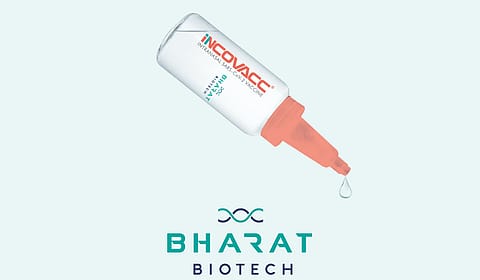Bharat Biotech’s intra-nasal vaccine approved as primary, heterologous booster
iNCOVACC becomes the world’s first intranasal vaccine to receive both primary series and heterologous booster approval.

Bharat Biotech's needle-free intranasal vaccine iNCOVACC has received approval from the drug regulator as a heterologous booster dose under restricted use in emergency situations for ages 18 and above in India. This makes iNCOVACC the world's first intra-nasal Covid-19 shot that has been approved as both primary series and heterologous booster. The vaccine has been designed for efficient distribution and easy and pain-free administration.
The vaccine was earlier approved as a primary dose schedule in September. Now it has received approval from the Central Drugs Standard Control Organisation (CDSCO) for use as both a primary dose and heterologous booster.
In heterologous boosting, a person is administered a different vaccine from what was used as a primary dose. The intra-nasal vaccine was approved after its successful evaluation in phase 1, 2, and 3 trials. "iNCOVACC is a recombinant replication-deficient adenovirus vectored vaccine with a pre-fusion stabilised SARS-CoV-2 spike protein. This vaccine candidate was evaluated in phases I, II and III clinical trials with successful results," says Bharat Biotech. However, the company has not provided the efficacy data on iNCOVACC so far.
iNCOVACC, which is stable at 2-8 degree Celsius for easy storage and distribution, has been specifically formulated to allow intranasal delivery through nasal drops, which is a cost-effective way to administer vaccines and can be really helpful in low-and middle-income countries.
The vaccine was developed in partnership with Washington University, St. Louis, which designed and developed the recombinant adenoviral vectored construct and evaluated in preclinical studies for efficacy. Product development related to preclinical safety evaluation, large-scale manufacturing scale-up, formulation and delivery device development, including human clinical trials, were conducted by Bharat Biotech.
Washington University had licensed the vaccine technology to Bharat Biotech for further development in 2020.
Notably, the government, through the department of biotechnology’s COVID Suraksha Program, also funded Bharat Biotech’s project in part for product development and clinical trials. "Despite the lack of demand for COVID vaccines, we continued product development in intranasal vaccines to ensure that we are well-prepared with platform technologies for future infectious diseases," said Krishna Ella, chairman and MD, Bharat Biotech. He said the company has also initiated the development of variant-specific vaccines for COVID for future preparedness.
Recommended Stories
Rajesh S. Gokhale, secretary, DBT, and chairperson, BIRAC, said the DCGI’s approval of Bharat Biotech’s intranasal vaccine is a moment of great pride. "This move will further strengthen our collective fight against the pandemic and broaden vaccine coverage.”
“We are excited by the expansion of the EUA for iNCOVACC as a booster, which enables this intranasal vaccine to be used by many more people, and hopefully curtail transmission,” said Michael S. Diamond, MD, PhD, of Washington University in St. Louis, who co-developed the nasal vaccine technology with Washington University colleague David Curiel, MD, PhD. “This approval will increase the options for people to get vaccinated and protected against the SARS-CoV-2 virus during the ongoing pandemic.”
According to Bharat Biotech, iNCOVACC has the double benefit of enabling faster development of variant-specific vaccines and easy nasal delivery that enables mass immunisation to protect from emerging variants of concern. The company will soon announce its launch date, pricing and availability.
The Covid situation has waned in India now, with the country reporting just 291 new Covid-19 cases and two virus-related deaths on Monday, the government data shows. As of now, the current active Covid case tally in India stands at 5,123.
(INR CR)
Why intranasal vaccine is crucial
An intranasal vaccine stimulates a broad immune response. The nasal route has excellent potential for vaccination due to the organised immune systems of the nasal mucosa. It's non-invasive and needle-free. It ensures ease of administration – does not require trained healthcare workers. It also eliminates needle-associated risks (injuries and infections).